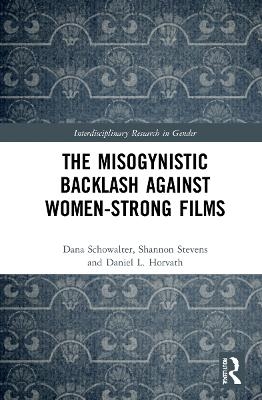
The Misogynistic Backlash Against Women-Strong Films
Routledge (Verlag)
978-0-367-26201-3 (ISBN)
The book draws from a variety of theoretical and methodological tools to provide critical cultural analysis and alternative readings of women-strong films and their important role in society. The authors engage with popular culture and the popular press, media studies, and rhetorical criticism examining new modes of communication while providing historical context to help make sense of these oppositional readings. The book includes case studies on Mad Max: Fury Road, Wonder Woman, Atomic Blonde, Star Wars, and Ghostbusters to analyze critical responses, men’s-rights activist boycotting campaigns, online harassment, and the political economy that precede and accompany the creation and presentation of these films.
This is an accessible and timely analysis of the rise of feminist-friendly and women-led films and the inevitable counterculture of misogyny. It is suitable for students and researchers in Media and Communication Studies, Gender and Media, and Cultural Studies.
Dana Schowalter is Associate Professor of Communication Studies at Western Oregon University. Her research interests include feminist media studies, feminist political economy, and global philanthropy. Her work has been published in Neoliberalism in the Media, Women and Language, and Communication Review. Shannon Stevens, Associate Professor of Journalism in the Department of English at California State University, Stanislaus, advises the student newspaper. A former journalist, she is a feminist rhetorician who researches media, popular culture, and policy. "The Rhetorical Significance of Gojira: Equipment for Living Through Trauma" appeared in The Atomic Bomb in Japanese Cinema: Critical Essays (2015). Daniel L. Horvath is a Part-Time Faculty in Communication Studies at California State University, Stanislaus. His research focuses on the way representation warps around critical categories of gender, race, class, etc. He published research on Michael Moore documentaries in Michael Moore and the Rhetoric of Documentary (2015) and on the rhetorical conditions of whistleblowing as a public act of parrhesia in Whistleblowing, Communication and Consequences (2021).
1. Introduction; 2. Misogyny and the Missive of Mediocrity: Disparaging Women-Strong Films in Movie Reviews; 3. The Economics of Misogyny and the "Surprising" Success of Woman-Strong Films; 4. "None of us asked for this": Ghostbusters, online harassment, and mechanized misogyny; 5. "Why You Should Not Go See ‘Mad Max: Feminist Road’": Parasitic Film Criticism and (Post) Apocalyptic Fears of Feminist Propaganda; 6. Star Wars (Toxic) Nostalgia and The Looming End of Man; 7. Atomic Blonde and Her Critics: Disciplining of a Pre-Patriarchal Feminine Archetype; 8. Conclusion: Counter Publics, Patriarchal (Reel)Realism, and a Call to Action
| Erscheinungsdatum | 01.12.2021 |
|---|---|
| Reihe/Serie | Interdisciplinary Research in Gender |
| Verlagsort | London |
| Sprache | englisch |
| Maße | 156 x 234 mm |
| Gewicht | 430 g |
| Themenwelt | Sozialwissenschaften ► Kommunikation / Medien ► Medienwissenschaft |
| Sozialwissenschaften ► Soziologie ► Gender Studies | |
| ISBN-10 | 0-367-26201-0 / 0367262010 |
| ISBN-13 | 978-0-367-26201-3 / 9780367262013 |
| Zustand | Neuware |
| Haben Sie eine Frage zum Produkt? |
aus dem Bereich


